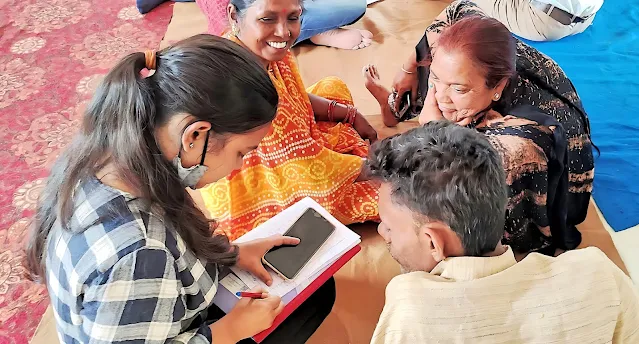By A Representative
Around hundred people from Khori Gaon, a 50-year old settlement at the Delhi-Haryana border demolished in the middle of the pandemic, gathered to celebrate International Women’s Day, raising slogans “We demand the freedom to go out, the freedom to work” (hum maang karte hai bahaar jaane ki azadi, kaam karne ki azadi), “We don’t beg for rights, we demand our rights” (hum humara haq maangte, nahi kisi se bheek maangte), and “Women power has arrived; a new dawn has arrived” (Mahila shakti aayi hain, nayi roshni layi hain).
Organised by NGOs Team Saathi and Dhuri, activists who joined in included Hemlata and Asha from the Azad Foundation, Shashi Gautam from the Authentic Foundation, Amit from the Delhi Commission for Women and students from Jamia Millia Islamia. They discussed women’s rights, gender-based violence and raised concerns about education and livelihood of women.
Khori Gaon residents spoke about the loss of families, livelihood and the cycle of denial of work and dignity following the demolition of their homes. “The government didn’t think before taking everything from us”, one of the speakers said. “They ruined our children’s education. I have tried to rebuild after the demolition, but it is very difficult. I have no help, I am a single mother.”
For many, the land where they built their families, made friends, celebrated festivals, and participated in the joy and sorrow of their neighbours has become a sad reminder of the abandonment and injustice by the government, an NGO note on the meet said.
Speakers also spoke about the importance of women’s education. “One educated woman educates all her sisters as well, pushes the struggle forward”, said an activist, urging those who had the opportunity to go to schools and colleges “to use their knowledge and skills to educate other women and help them with their documents.”
Around hundred people from Khori Gaon, a 50-year old settlement at the Delhi-Haryana border demolished in the middle of the pandemic, gathered to celebrate International Women’s Day, raising slogans “We demand the freedom to go out, the freedom to work” (hum maang karte hai bahaar jaane ki azadi, kaam karne ki azadi), “We don’t beg for rights, we demand our rights” (hum humara haq maangte, nahi kisi se bheek maangte), and “Women power has arrived; a new dawn has arrived” (Mahila shakti aayi hain, nayi roshni layi hain).
Organised by NGOs Team Saathi and Dhuri, activists who joined in included Hemlata and Asha from the Azad Foundation, Shashi Gautam from the Authentic Foundation, Amit from the Delhi Commission for Women and students from Jamia Millia Islamia. They discussed women’s rights, gender-based violence and raised concerns about education and livelihood of women.
Khori Gaon residents spoke about the loss of families, livelihood and the cycle of denial of work and dignity following the demolition of their homes. “The government didn’t think before taking everything from us”, one of the speakers said. “They ruined our children’s education. I have tried to rebuild after the demolition, but it is very difficult. I have no help, I am a single mother.”
For many, the land where they built their families, made friends, celebrated festivals, and participated in the joy and sorrow of their neighbours has become a sad reminder of the abandonment and injustice by the government, an NGO note on the meet said.
“I have stopped coming to Khori Gaon because it breaks my heart to see what they’ve done. We keep going from one office to the other, meeting politicians, but it seems the government is not interested in even listening to us. The only solace I have is that the community is fighting together”, an activist said.
Women participants highlighted the pitiable state of rehabilitation and apathy towards the needs of the community. “We don’t want a box to live in; we demand justice”, said one of them. Insisted another woman added, "What is the point of Women’ Day when women do not have any right to live for herself. After working outside, she is still expected to do domestic work. Even after facing so many difficulties and struggles, their resolve to fight never diminished. We are not weak; the government is weak. When a woman decides, no one can stop her.”Speakers also spoke about the importance of women’s education. “One educated woman educates all her sisters as well, pushes the struggle forward”, said an activist, urging those who had the opportunity to go to schools and colleges “to use their knowledge and skills to educate other women and help them with their documents.”



Comments